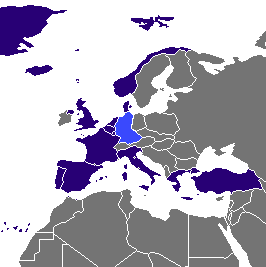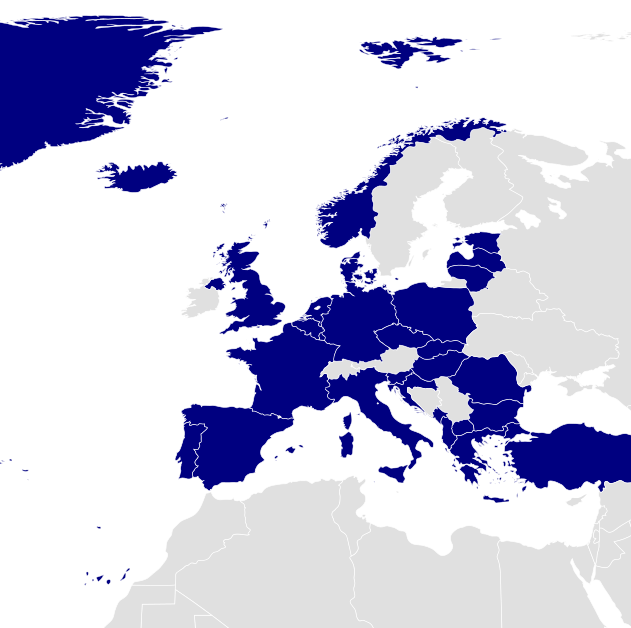
Let us take stock of NATOs fiefdoms in Europe. The map (right) shows the extent of NATO in Europe in 1990: (source: Wikipedia as at 20 Jan. 2022): Since the organisation’s foundation in 1949, only four states had joined: West Germany, Greece and Turkey (in 1952) and Spain (in 1982 after the end of the Fascist dictatorship).
The light blue patch denotes that Germany was being unified and that what had been East Germany would soon be included in NATO. East Germany’s inclusion was the source of negotiations between the Soviet Union and Western powers.
Since then — only 30 years ago — the outcome of these negotiations appears to have been “forgotten” by the Western powers. Agreements were reached in 1989 through 1991, that the Western powers subsequently failed to honour.
As a Norwegian, I am particularly pained and humiliated by the abject lies told by my former Prime Minister, the current dangerously silly secretary general of NATO. See for yourself in the National Security Archive that the Western powers pledged that NATO would not expand “one inch” eastwards.

Now this is the extent of NATO in 2020:
(source: Wikipedia as at 20 Jan. 1922):
See a difference?
All the former European Warsaw pact states have been joyously welcomed into NATO. Well, not all: Moldova is not a member, and Belarus is Dictator Putin’s plaything.)
And then there is, of course, Ukraine.
Now I am sure that most of us agree that Mr Putin is as much of a psychopath as President el-Sisi of Egypt and the handsome prince of Saudi Arabia and whoever is in charge in Israel at any given moment, currently Benny Ganz, all three of whom systematically and continuously commit crimes against humanity.
But NATO does not go to war on Egypt or Saudi Arabia or Israel, far from it! These three countries are NATO allies. So please let us agree on one point:
NATO is absolutely indifferent about human rights.
I repeat: NATO DOES NOT DEFEND HUMAN RIGHTS.
NATO cares only about “realpolitik” (as defined in Wikipedia as at 20 Jan. 1922):
… politics or diplomacy based primarily on considerations of given circumstances and factors, rather than explicit ideological notions or moral and ethical premises. In this respect, it shares aspects of its philosophical approach with those of realism and pragmatism. It is often simply referred to as “pragmatism” in politics, e.g. “pursuing pragmatic policies”. The term Realpolitik is sometimes used pejoratively to imply politics that are perceived as coercive, amoral, or Machiavellian.
So I ask you:
If you were Russian, living in Russia, and your president told you that “our country is surrounded by NATO and risks being attacked”, and you looked at the two above maps, what would you think of NATO? …. a NATO that is now literally hugging all your European borders except that of Sweden, Finland and Ukraine, a NATO that is now determined to include even Ukraine.
Would you consider NATO expansion “peaceful”?
And I ask you also:
If you were Russian, living in Russia, and you looked at the two above maps, would you oppose your president? … a president who, admittedly, uses all “necessary” means to suppress serious resistance to his regime, but who is determined to uphold Russia’s honour.
Or would you gladly defend your country against NATO?
Please remember that Russians love their country just as much as you love yours.
Now, I put to you that the current secretary general of NATO is not a smart player, is not even vaguely a statesman. He is merely a puppet of the Pentagon (i.e. US military industry) and is, probably unwittingly (poor man), acting as a warmonger.
Analogy: A kid is surrounded by bullies telling him to lie down on the ground, or else!
Now if that kid happens to have a switch-blade in his pocket, he might actually fight back, and maybe his friends (China, Iran and other outcasts) will come to his rescue and the outcome will be extremely bloody.
I don’t like kids with switch-blades anymore than you do. But I think we have to rethink foreign relations. Silliness should certainly not determine the fate of any country’s population.
In a recent substack post by Glenn Greenwald about the unholy alliance between “war hungry” neocons and the Democratic Party, I find a quote from Adam Smith’s The Wealth of Nations:
In great empires the people who live in the capital, and in the provinces remote from the scene of action, feel, many of them, scarce any inconveniency from the war; but enjoy, at their ease, the amusement of reading in the newspapers the exploits of their own fleets and armies. To them this amusement compensates the small difference between the taxes which they pay on account of the war, and those which they had been accustomed to pay in time of peace. They are commonly dissatisfied with the return of peace, which puts an end to their amusement, and to a thousand visionary hopes of conquest and national glory from a longer continuance of the war.
Now that’s silly for you.!
Reality is this:
(Copied from the New York Times, photo by Diego Ibarra Sanchez)

